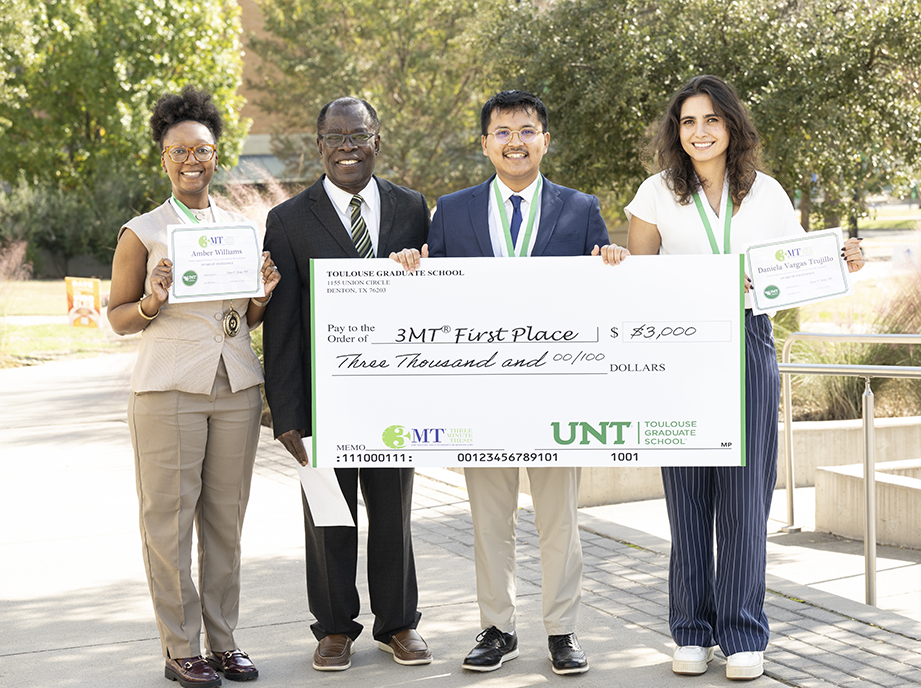As a kid, Adrian Heckart (’22) remembers hearing his grandpa coughing a lot. Now, as a UNT biochemistry and molecular biology student, he’s been wondering if years of exposure to dust and soil on the job could’ve impacted the health of his grandpa and many others working in industries like agriculture and construction.
That notion is partly what led him to study the soil-dwelling fungus Histoplasma capsulatum for his master’s thesis. The fungus can hide within immune cells and evade the body’s natural defenses, causing flu-like symptoms, breathing problems and, for some, chronic lung damage.

“Fungal diseases like this are among the most under-researched. Today, there are no FDA-approved fungal vaccines, and there are only a limited number of anti-fungal drugs to address these illnesses. The need for new treatments is urgent,” Heckart (pictured above) declared during his research presentation Nov. 16 at UNT’s Three Minute Thesis (3MT) competition.
In the final round of UNT’s 3MT hosted by the Toulouse Graduate School and Graduate Student Council, Heckart and the 11 other student finalists had three minutes to present their research using only one presentation slide. Students came from a variety of disciplines, presenting research that ranged from academic dishonesty in the age of artificial intelligence to developing titanium alloys for more efficient, cost-effective aerospace vehicles.
A panel of judges — Thomas White, Janet Bracken (’14) and Deanna Sanchez (’00) — deliberated on site and named Heckart the overall winner. Amber Williams, a doctoral student in clinical psychology, took second place for her presentation about how resilience and self-doubt can influence the educational journey of psychology students. Then, the audience voted chemistry doctoral student Daniela Vargas Trujillo as the people’s choice winner for sharing her study of metal properties for developing more affordable metals in the future.
As the winner, Heckart earned $3,000 and will represent UNT during the 3MT competition at the Conference of Southern Graduate Schools annual meeting in March. The second and people’s choice award winners received $2,000 and $1,000, respectively.
The 3MT competition — developed by The University of Queensland in Australia — is a worldwide academic research competition series that UNT has participated in since 2015. It was designed to help students hone their communication and presentation skills when talking about their research.
“We want our students to go out there and make a difference in the world, but it’s difficult to be impactful when people can’t understand what you’re talking about,” says Associate Dean of the Toulouse Graduate School Joseph Oppong, who first brought 3MT to UNT.
“3MT challenges our students to become more effective communicators, presenting their research in an engaging, meaningful and concise way that can be understood by people outside of their academic field.”
Heckart, who earned his bachelor’s degree in biological sciences from UNT in 2022, says he’s taken every opportunity to present his research as a student, whether that’s attending conferences, sharing with other departments and institutes or, most recently, participating in 3MT.
As an undergrad, Heckart found purpose in his research after attending a workshop for first-year underrepresented STEM students led by principal lecturer Amy Petros.
“She introduced me to how you can leverage research as a tool to bridge health care gaps,” he says. “So, I looked for projects like that on campus, and I found the one on Histoplasma capsulatum with Dr. Alonso.”
Under the guidance of Ana Paula Alonso, professor of biochemistry and molecular biology, Heckart has helped uncover more about how Histoplasma capsulatum survives in the human body by investigating the nutrients it consumes within immune cells, which gives scientists more fundamental knowledge in the fight against fungal diseases. The research is part of a project Alonso is working on with a grant from the U.S. National Institutes of Health in collaboration with The Ohio State University.
“My research that I presented at 3MT is just the first step I’m taking toward bridging health care gaps,” Heckart says. “In the future, I want to become a physician-scientist and continue helping people on a community level and global scale.”